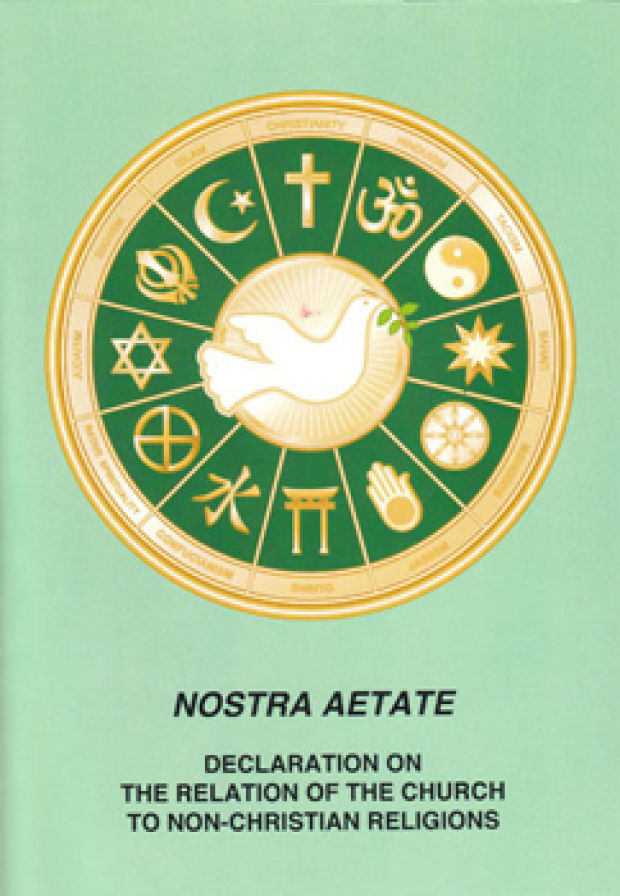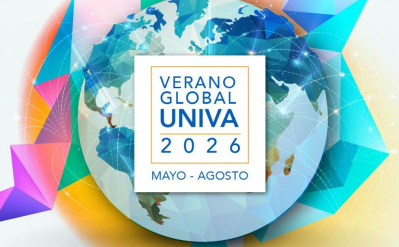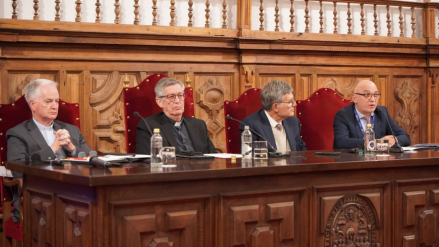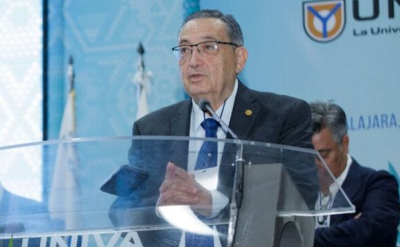News

Catholic universities at the time of Nostra Aetate: sixty years of dialogue, a future for academic diplomacy
I. From the conciliar declaration to university culture
Sixty years after its promulgation, Nostra Aetate remains without doubt one of the most significant texts of the Second Vatican Council. Published on October 28, 1965, the Declaration on the Church's relations with non-Christian religions marked a major anthropological turning point: the transition from a theology of difference to a theology of encounter. It invited the Church to recognize the seeds of truth present in all religious traditions, and to open up to dialogue based on the common dignity of the human person.
This text, initially perceived as a spiritual breakthrough, has gradually become a cultural and educational matrix. For dialogue is not just an attitude; it is a pedagogy, an intellectual method and a social horizon. Nowhere has this dynamic taken on more substance than in Catholic universities: places where faith confronts reason, where tradition becomes culture, and where otherness becomes an object of study as much as a promise for the future.
The history of Nostra Aetate within the Catholic academic world is that of a slow and fruitful translation: from a conciliar word to a university praxis, from a spiritual exhortation to a global ecosystem of formation and research. On a global scale, the International Federation of Catholic Universities (IFCU) is witnessing the extent to which this conciliar intuition is still alive and well: it structures campuses, inspires pedagogies and provides the basis for a veritable diplomatic language of knowledge.
II. Mapping an intellectual reception worldwide
As the commemorations of the sixtieth anniversary in 2025 made clear, Nostra Aetate has become a common language for almost all the world's Catholic universities. From Washington to Nairobi, from Beirut to Manila, the conciliar text inspires research programs, lecture series and interfaith cooperation projects.
In Europe
The Institut Catholique de Paris organized two webinars entitled "Nostra Aetate: 60 years on?", bringing together theologians, Islamologists and sociologists of religion. In Germany, the Katholische Universität Eichstätt-Ingolstadt devoted its 2025 Religion und Gesellschaft Forum to " Nostra Aetate and the refoundation of Christian-Islamic dialogue". This event, held in partnership with the German Bishops' Conference and the University of al-Azhar, illustrates an approach in which interfaith dialogue is both an object of research and a social requirement.
In Belgium, KU Leuven has incorporated the reception of Nostra Aetate into its LEST XV congress, dedicated to the horizons of world Catholicism. These initiatives demonstrate the intellectual vigor of a conciliar heritage that has become academic culture.
Last but not least, the Pontifical Roman Universities - in particular the Gregorian University - hosted the international colloquium "Towards the Future: Re-thinking Nostra Aetate Today", in coordination with the Dicastery for Interreligious Dialogue. The event in Rome symbolized the convergence of magisterium, research and pedagogy, confirming the role of the Holy See as a catalyst for this global intelligence of dialogue.
In North America
Since 2015, Georgetown University has maintained the Nostra Aetate Lecture Series, an intellectual institution where cardinals, rabbis and Muslim scholars meet. The University of Notre Dame, for its part, launched in 2025 a lecture series entitled "Nostra Aetate in Their Age and in Ours"in partnership with the Hebrew University of Jerusalem - illustrating how Catholic research here becomes an instrument of reconciliation.
In Latin America
The Pontificia Universidad Católica de Puerto Rico and the Universidad Católica del Uruguay organized symposia with Jewish and Muslimand Muslim representatives, while the Universidad Católica de Costa Rica celebrated the anniversary with the Israeli Embassy. These initiatives underline the extent to which Nostra Aetate nurtures a pluralism rooted in the continent's culture.
In Africa and the Middle East
In Lebanon, Notre Dame University - Louaize (NDU) embodies the spirit of Nostra Aetate in a context of dense religious pluralism. The university, which hosts the UNESCO Chair for Peace Education, organizes an annual Interreligious Peace Week and trains its students in coexistence through courses explicitly inspired by the conciliar document. A veritable laboratory for Islamic-Christian dialogue, the NDU makes its campus a place of experimentation for an open and hospitable Catholicity, where pluralism becomes an intellectual skill and a social project.
In Africa, institutions such as the Catholic University of Central Africa (UCAC) and the Catholic University of Congo (UCC) are developing curricula on religious coexistence, extending the conciliar logic into societies with lived pluralism.
III. From text to ecosystem: the spirit of Nostra Aetate in contemporary pedagogy
What the diversity of these celebrations reveals is that Nostra Aetate is no longer just a Church document: it's an educational culture.
In Catholic universities today, it inspires a pedagogy of relationships:
- An intellectual pedagogy that rejects relativism while recognizing the plurality of lived truths;
- A spiritual pedagogy, which sees the encounter with others as an opportunity for inner conversion;
- A pedagogy of citizenship, in which interreligious dialogue becomes a school of peace and a laboratory of humanity. The symposium organized on this subject at Christ University in Bangalore in November 2026 will be an excellent illustration of this.
Catholic campuses are thus at the forefront of a profound transformation in higher education: they no longer simply train competent graduates, but relational subjects capable of understanding the fractures of a globalized world. Pluralism is seen not as a threat, but as an opportunity for discernment.
IV. Catholic universities as diplomats of knowledge
If Nostra Aetate has transformed theology, it has also transformed the silent geopolitics of knowledge. Today, Catholic universities can constitute a network of intellectual diplomacy, unique in its scope and moral authority. In the academic arena, they can extend the diplomacy of the Holy See: a diplomacy without armies or borders, but based on words, research and cooperation. This is one of the main thrusts of the new FIUC President's strategic plan.
1. The campus as embassy
Every Catholic university, when it opens a space for the comparative study of religions or welcomes students from other traditions, acts as an intellectual embassy for the spirit of Nostra Aetate. In Washington, Beirut or Manila, these institutions make visible a Catholicity that is open, hospitable and in constant dialogue with the world. At the last IFCU General Assembly in Guadalajara, Archbishop Gallagher declared: " Every university can be something of a diplomatic mission. These networks foster not only scientific progress but also relationships grounded in mutual respect and shared goals. What better place than a university classroom to bring Christians, Muslims, Jews, Buddhists, and non-believers together? Here, students and scholars confront difference constructively, moving beyond stereotypes toward genuine mutual understanding. This lived 'academic diplomacy' builds trust and defuses tensions at the basic, everyday, human level. In this way, universities are not ivory towers detached from reality-they are active subjects shaping a culture of peace".
2. Knowledge as mediation
At a time of identity withdrawal and religious conflict, Catholic universities embody the diplomacy of reason. They offer a framework where research becomes mediation and science becomes a service to peace. Their teachers are, in fact, diplomats of meaning: they negotiate the boundaries of otherness to better reveal its fruitfulness.
3. Global leadership in dialogue
FIUC, with its transcontinental vocation, is the infrastructure of this academic diplomacy. It links over two hundred universities on five continents, encourages interfaith partnerships, supports joint research and gives the Catholic university world a unified voice in global debates.
Asserting this intellectual leadership today is not a question of influence, but of responsibility: of reminding us, in a fragmented world, that truth cannot be possessed - it must be shared.
It is on this condition that the Catholic university can become what Nostra Aetate foresaw: a place where mutual recognition precedes knowledge, and where knowledge nourishes peace.
Conclusion: for a catholicity of encounter
Sixty years after Nostra Aetate, the challenge is no longer simply to commemorate a text, but to live its dynamic. The world of 2025 is no longer that of the Council: it is traversed by new cultural, digital and identity-based divides. But it is precisely in this context that the spirit of the Council regains its relevance.
Catholic universities are already frequently, but more than ever, laboratories of unity in diversity, capable of showing that a solid identity is not a closed one. In a world where hate speech spreads at the speed of social networks, interreligious dialogue is not a soul supplement; it is a strategy for civilization.
The International Federation of Catholic Universities has a singular mission here: to articulate the spiritual heritage of Catholicism and the universality of knowledge. By federating initiatives, stimulating research and embodying academic diplomacy for the common good, IFCU can give Nostra Aetate a new impetus: that of a thinking, dialogical and global Catholicity. What Nostra Aetate announced on the spiritual level, these universities embody today on the intellectual level: a globalization of meaning rather than a standardization of knowledge.
Dr François Mabille, IFCU Secretary General














No comment
Log in to post comment. Log in.